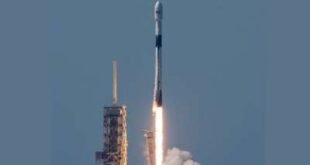
Russia’s long-awaited return to lunar exploration has taken a tragic turn as the Luna-25 probe, a pivotal part of the country’s space ambitions, met a devastating end with a crash during its pre-landing maneuvers on the Moon’s surface. The somber news was officially confirmed by Russia’s space agency, Roscosmos, casting a cloud of uncertainty over the mission’s objectives and Russia’s lunar aspirations.
At 2:57 pm (11:57 GMT), the Luna-25 probe abruptly lost communication with Earth, leaving mission controllers in suspense. Roscosmos promptly released a statement detailing the grim circumstances surrounding the probe’s demise. Preliminary findings pointed to an “emergency situation” onboard the automatic station during the critical transfer maneuver. This unfortunate development led to an unpredictable orbit and eventual collision with the lunar surface.
Efforts to reestablish contact with the Luna-25 were undertaken on August 19 and 20, but they proved futile, further underscoring the challenges of space exploration. Roscosmos has pledged a comprehensive investigation into the causes of the crash, though specific technical issues have yet to be disclosed.
The Luna-25 mission, weighing in at 800 kilograms, carried the aspiration of marking a historical milestone by achieving a soft landing on the lunar south pole. This feat had eluded space agencies for decades, including Russia’s previous attempt in 1989 when the Phobos 2 probe, aimed at exploring the moons of Mars, faltered due to an onboard computer malfunction.
In recent months, Russia’s space agency demonstrated optimism regarding Luna-25’s prospects, with the head of Roscosmos, Yuri Borisov, acknowledging the mission’s inherent risks. Despite estimating a roughly 70 percent chance of success, the mission’s trajectory appeared promising. The probe had successfully entered the Moon’s orbit shortly after its launch from the Vostochny Cosmodrome, marking a significant step toward its intended destination.
Luna-25’s original objectives encompassed a year-long stay on the Moon, during which it was slated to gather vital soil samples and investigate the presence of water. The lander’s cameras had already captured captivating images of the lunar surface, providing a glimpse into the extraterrestrial landscape.
The mission held immense promise for Russia, seeking to build upon the legacy of its Soviet-era Luna program. However, this setback arrives amidst a backdrop of Russia grappling with both internal and external geopolitical challenges, underscoring the complexities of balancing space endeavors with broader national concerns.
Coincidentally, Luna-25’s downfall aligns with India’s Chandrayaan-3, another lunar probe, successfully entering the Moon’s orbit earlier in August. If India manages to execute a successful landing on the Moon’s south pole, it will join the ranks of countries such as Russia, the United States, and China, further advancing humanity’s conquest of the cosmos.
As Russia comes to terms with the Luna-25 mission’s tragic conclusion, the global space community is reminded once again of the relentless challenges and uncertainties that accompany the pursuit of exploring the final frontier.
Sources By Agencies
 Digital Scoop India Official Platform of Digital Scoop India Featuring Latest & Best News #Articles #Bytes #Entertainment #DigitalScoopMagazine
Digital Scoop India Official Platform of Digital Scoop India Featuring Latest & Best News #Articles #Bytes #Entertainment #DigitalScoopMagazine


